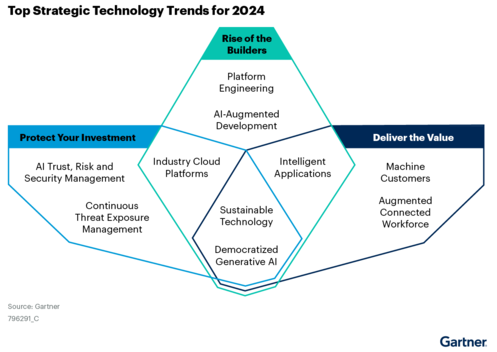--
Gartner, Top Strategic Technology Trends for 2024, By Bart Willemsen, Gary Olliffe, Arun Chandrasekaran, 16 October 2023.
GARTNER is a registered trademark and service mark of Gartner, Inc. and/or its affiliates in the U.S. and internationally and is used herein with permission. All rights reserved.
*Source https://www.gartner.com/en/articles/machine-customers-will-decide-who-gets-their-trillion-dollar-business-is-it-you
Top strategic technology trends for 2024: Supporting the future of business

New report from Gartner®
In the fast-paced world of technology, staying ahead of the curve is crucial for business success. But even more important is to choose to invest in technologies that can support your overall business strategies. To help you evaluate the impact and benefits of strategic technologies, Gartner® has published their take on the trends for 2024 to help you to determine which trends have the most impact on your business.
The Gartner® top strategic technology trends that will be at the forefront of business and technology decision next year and beyond are:
AI Trust, Risk and Security Management
The use of artificial intelligence is on the rise, but so are concerns about trust, risk, and security. AI trust, risk and security management (TRiSM) focuses on managing these critical aspects to ensure that AI technologies can be leveraged effectively and ethically.
Continuous threat exposure management
In a world where cyber threats are ever-present, continuous threat exposure management (CTEM) is the proactive approach to managing and mitigating cybersecurity risks. It enables organizations to stay one step ahead of potential threats by continuously monitoring and adapting to evolving threat landscapes.
Sustainable technology
The use of technologies such as AI, cryptocurrencies, IoT, and cloud is further driving the concerns over the related energy consumption. Sustainable technology trends address the urgent need to create more eco-friendly and socially responsible solutions that not only reduce environmental impact but also have an impact on brand reputation.
Platform engineering
As businesses evolve and expand their digital footprint, platform engineering becomes vital. It involves the design and development of robust, scalable, and flexible platforms to support various technologies and services within an organization. Each platform is a layer with a dedicated product team designed to optimize the user experience and business value.
AI-augmented development
AI is not just a tool; it's a collaborator. AI-augmented development integrates artificial intelligence to enhance the capabilities of software developers, making the development process more efficient and innovative. Gartner® predicts that by 2028, 75% of enterprise software engineers will use AI coding assistants, up from less than 10% in early 2023.
Industry cloud platforms
Enterprises demand specific business outcomes from their cloud investment and industry cloud platforms (ICPs) can help to bridge the gap by delivering industry-specific cloud services. ICPs are tailored to provide the infrastructure and services required to support industry-specific applications, ensuring optimal performance and compliance. For example, IBM is positioning itself in this market segment with a dedicated cloud platform for several industries, including healthcare, financial services, and supply chain.
Intelligent applications
Intelligent applications are redefining user experiences and business processes by incorporating AI and machine learning to make applications smarter, more responsive, and more adaptive to users' needs. The intelligence can be utilized in many use cases to augment or automate tasks.
Democratized generative AI
Generative AI (GenAI) applications can make vast sources of internal and external information accessible and available to business users. Making AI technology more accessible and user-friendly can significantly democratise knowledge and skills in the enterprise. Large language models enable enterprises to connect their workers with knowledge in a conversational style with rich semantic understanding.
Augmented connected workforce
Augmented connected workforce is a strategy driven by the need to accelerate and scale talent. Using workforce analytics and intelligent apps, augmented connected workforce supports the experience, well-being, and capacity for the skills development of the workforce by offering everyday context and direction, seamlessly blending human and digital skills.
Machine customers
Machine customers – also known as custobots – represent a shift in how businesses interact with their clients. These AI-driven, non-human entities can autonomously negotiate and purchase goods and services. According to Gartner®, this growth trend, augmented by GenAI, will impact trillions of dollars in purchases and eventually become more significant than the arrival of digital commerce.*
Innovations that drive the most value for your business
It is clear that AI plays a pivotal role in shaping the future of business, offering new opportunities and driving a range of trends, including the ones listed above, in technology. Gartner®, however, suggests deriving business value from the durable use of AI requires a disciplined approach to widespread adoption, in combination with attention to the risks.
To stay competitive and relevant, organizations should evaluate the potential impacts and benefits of these technology trends, ultimately determining which innovations or strategic combinations will have the most significant impact on their success.
This report is no longer available to download.